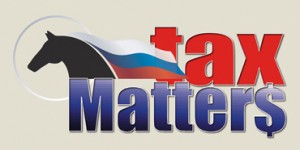Tax Matters – New Tax Court Case Discusses Passive Loss Issue
Click here to read the complete article
122 – November/December, 2014
by John Alan Cohan, Attorney at Law
The IRS will often argue that a taxpayer is not eligible to deduct losses for a horse business because it’s a “passive activity.” The Material Participation Test (sec. 469 IRS Code) defines a passive activity as a business in which the taxpayer does not “materially participate.”
An important new Tax Court case on this subject is Tolin v. IRS Commissioner [T.C. Memo 2014-65], ruled in favor of the taxpayer on this issue. The taxpayer, an attorney in Minneapolis, devoted significant time to thoroughbred racing and breeding. The IRS claimed that the taxpayer’s losses from the thoroughbred business should be disallowed because they were passive activity losses. (The IRS conceded that the activity was a business, not a hobby.)
The Material Participation Test requires that a taxpayer engage in the activity on a “regular, continuous and substantial basis.” The test also requires that the taxpayer actually does participate in the activity as a principal or a manager, and that he actually does exercise the powers of decision-making reposed in him.
The taxpayer in this case argued that he had spent over 500 hours per year in the activity – thus satisfying one of several alternative standards to prove material participation.
He sent his breeding stallion to trainers, and the horse was entered in a number of races, earning $77,638. The stallion then sustained a leg injury that prematurely ended his racing career. The taxpayer then offered the stallion, Choosing Choice, for stud service, and bred to three of his own mares. He stood the stallion on a farm in Louisiana to take advantage of that state’s breeding incentive program. As to his own foals, he sent them as yearlings to individualized training programs.
The taxpayer gave credible testimony about time he spent in managing his thoroughbred activity. He conferred daily by phone with his stallion manager, trainers and another adviser; he called breeders who might be interested in his stallion, and even made “cold calls” to members of the Louisiana Thoroughbred Breeders’ Association directory. He mailed a promotional package to interested breeders with personalized letters. He placed full-page print ads in the Louisiana Horse, and Louisiana Stallion Register. He made numerous trips to Louisiana during the years at issue, and met as many horse breeders and farm managers as possible while there.
Administrative tasks included reviewing and paying bills, keeping the books, arranging for mortality insurance, paperwork for registration. He subscribed to and read a number of horse industry publications, and attended seminars regarding equine health. He supervised editing of a video on his stallion.
The IRS disputed the time claimed by the taxpayer. Time spent on an activity may be proven by any reasonable means. It is not necessarily to have contemporaneous logs, although if available, that constitutes very strong evidence.
The IRS argued that much of the time spent by the taxpayer constituted activities as an “investor,” not as an entrepreneur of a going business. Under the Material Participation Test, activities as an “investor” are specifically excluded from time counted towards meeting the test.
The Tax Court disagreed with the IRS on this point, saying: “Petitioner was directly involved in the day-to-day management and operation of the thoroughbred activity; therefore, any investor work he completed qualifies as participation for purposes of section 469.”
In proving time expended people usually do not have contemporaneous logs. Time may be proven using phone records, credit cards invoices, and a narrative summary of the activities. Activities include phone conversations, emails, research, preparing and distributing promotional materials, business trips, registration and insurance paperwork, reviewing and paying bills, recordkeeping, continuing education and administrative tasks. Third party witness testimony (from trainers and advisers) is important to corroborate a taxpayer’s statement of time expended.
John Alan Cohan is a lawyer who has served the horse, farming and ranching industries since l98l. He can be reached at: (3l0) 278-0203, by e-mail at johnalancohan@aol.com, or you can see more at his website: www.johnalancohan.com.











